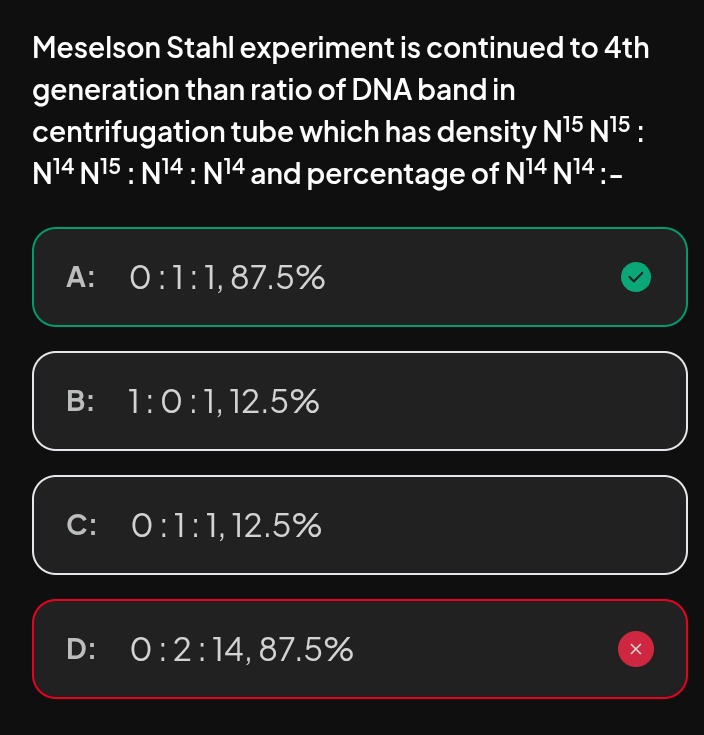Question
Question: Meselson Stahl experiment is continued to 4th generation than ratio of DNA band in centrifugation tu...
Meselson Stahl experiment is continued to 4th generation than ratio of DNA band in centrifugation tube which has density N15N15: N14N15: N14 : N14 and percentage of N14 N14 :-

0:1:1, 87.5%
1:0:1, 12.5%
0:1:1, 12.5%
0:2:14, 87.5%
0:2:14, 87.5%
Solution
The Meselson-Stahl experiment demonstrates the semi-conservative nature of DNA replication. We track the composition of DNA molecules through successive generations when bacteria initially grown in a heavy nitrogen (N15) medium are transferred to a light nitrogen (N14) medium.
-
Generation 0 (Parental): All DNA is N15N15 (heavy).
- Number of DNA molecules: 1
- Composition: 1 N15N15
-
Generation 1 (after one replication in N14 medium): Each N15N15 molecule unwinds, and each N15 strand serves as a template for a new N14 strand.
- Number of DNA molecules: 2 (21)
- Composition: 2 N14N15 (hybrid)
- Ratio N15N15 : N14N15 : N14N14 = 0 : 2 : 0
-
Generation 2 (after second replication in N14 medium): Each of the two N14N15 molecules replicates.
- Each N14N15 molecule produces one N14N15 and one N14N14.
- Number of DNA molecules: 4 (22)
- Composition: 2 N14N15 (hybrid) and 2 N14N14 (light)
- Ratio N15N15 : N14N15 : N14N14 = 0 : 2 : 2
-
Generation 3 (after third replication in N14 medium): The 4 DNA molecules replicate.
- The 2 N14N15 molecules produce 2 N14N15 and 2 N14N14.
- The 2 N14N14 molecules produce 4 N14N14.
- Number of DNA molecules: 8 (23)
- Composition: 2 N14N15 (hybrid) and (2+4) = 6 N14N14 (light)
- Ratio N15N15 : N14N15 : N14N14 = 0 : 2 : 6
-
Generation 4 (after fourth replication in N14 medium): The 8 DNA molecules replicate.
- The 2 N14N15 molecules produce 2 N14N15 and 2 N14N14.
- The 6 N14N14 molecules produce 12 N14N14.
- Number of DNA molecules: 16 (24)
- Composition: 2 N14N15 (hybrid) and (2+12) = 14 N14N14 (light)
- Ratio N15N15 : N14N15 : N14N14 = 0 : 2 : 14
Now, calculate the percentage of N14N14 DNA:
Percentage N14N14 = (Number of N14N14 molecules / Total number of DNA molecules) × 100
Percentage N14N14 = (14 / 16) × 100 = (7 / 8) × 100 = 0.875 × 100 = 87.5%
Thus, the ratio of DNA bands N15N15: N14N15: N14N14 is 0:2:14, and the percentage of N14N14 is 87.5%.
